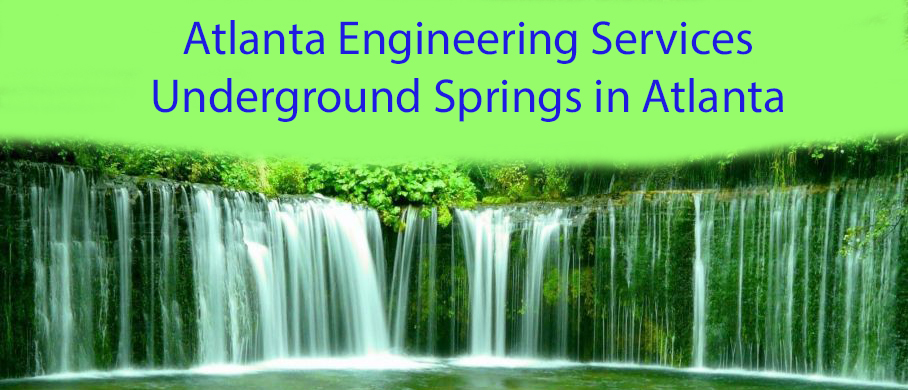For service in the Atlanta, Georgia area contact or call us:
Groundwater Springs in Atlanta

Do You Have a Groundwater Spring?
What are groundwater springs?
We will discuss two types of springs. The first type of spring discharges from the ground due to pressure from underground aquifers. The second is saturated subsurface that seeps from the ground causing the surface to be wet.
I know some parts of the country have groundwater springs from an underground water source. Water flows from the spring throughout the year. The flowing water from these springs is the result of an underground aquifer that holds water. The water flows downgrade until it finds an outlet in the ground surface and discharges through the opening. Often, the water flows under pressure, much like an opened fire hydrant.
The second type of spring is not a spring but ground seepage. The ground gets saturated with water, and the water table rises. Water released from the groundwater table soaks the ground surface. Yards stay wet and soggy for days.
Reasons for Groundwater Seepage
Seepage is a term that refers to water discharged from the ground at a slow rate of flow. The slow-moving water gradually reaches the upper ground surface and flows across the property — the source of the water is from the higher elevation.
The drainage basin size is a factor in the amount of discharge of water to the ground surface. The larger the basin, the more water that is available to saturate your yard.
The amount of rain during the preceding months is an important consideration. An excessive amount of rain will cause your water table to rise. Water seeks the path of least resistance and seeps through the ground surface. Water saturates your yard causing damage to your lawn.
Reasons for Wet Yards
We receive many calls about wet yards and groundwater springs. Homeowners sometimes assume a spring has formed in their backyard. They become alarmed by the damp condition of their yard.
There are many reasons a yard will become soggy and wet. Consider these suggestions:
- First, construction activities on properties at a higher elevation may redirect groundwater. Construction projects with deep underground foundations can cause underground water to flow in a slightly different direction. The additional water saturates your property and causes the groundwater to seep through the ground surface.
- Second, a long rainy season will cause the water table to rise. The elevation of the water table's top may be more than in the past and flow down gradient and surface in your yard.
- Third, I suggest looking around. You might find the water coming from your neighbor's property. A landscaping project which regrades the yard could be the cause of the additional water to your yard. If the neighbor adds gutter and downspouts, the water will be collected and released as a point discharge. Did the neighbor redirect additional water to your property?
- A final example: A neighbor forgets to turn the outside water hose off before going on vacation for two months. Our client called the county and engaged several plumbers to find the source of their water problem. No one could locate the reason for the wet yard. A little search revealed the neighbor's water hose to be the source of the water. Pine straw covered the outlet of the garden hose that had been running water for two months. The water flowed downhill to our client's property.
How do You Solve Groundwater Springs
and Wet Yard Problems?
If you have researched all that you know to do, call a drainage specialist. Don't call the county or the city unless the problem is in the street. Rarely do public officials work on private property.
Professional hydrologists are trained in surface and underground water issues. A hydrologist will inspect your property and determine the source of the problem. He can prepare a plan to solve your groundwater spring or seepage problem.
Hydrologist are not in the construction business and are not there to sell you a construction project. They help you find a solution to your drainage problem.
Hydrologist -
Atlanta Engineering Services
Our hydrologist has investigated hundreds of drainage issues and will determine if you have an underground spring or water seepage from higher elevations. He has worked on hundreds of groundwater spring and seepage problems. He is experienced in solving groundwater problems.
Our hydrologist will visit your property, inspect the water issues and make recommendations for solving the seepage problem. He will provide a solution to your groundwater spring that you can give to your contractor.
Call Atlanta Engineering Services for additional information about our stormwater drainage specialist at 770-316-1720.
Other Stormwater Drainage Articles. . . .
Find a Drainage Specialist for drainage consultation
Yard Drainage Problems Devalues Property
Simple Solutions to Residential Drainage Problems
Learn the Benefits of Stormwater Drainage Swales
Solving Wet, Soggy Yard Problems
Common Drainage Problems of Homeowners
Preventing Crawl Space Drainage Issues
Do you have a Groundwater Spring on your Property?
Stormwater Damage from the Property Upstream
Stormwater Utilities and Detention Ponds
Forensic Hydrologist Evaluates Stormwater Runoff
Hydrology Expert Contact Information
G-ZNJ8QW23K9
